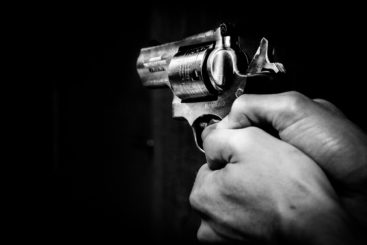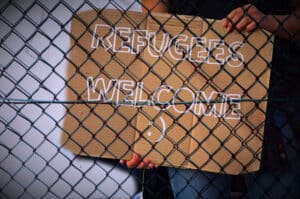
Is it genocide?
Cause I can still hear his mama cry
Know the family traumatized
Shots left holes in his face about piranha-sized
The old pastor closed the cold casket, and said the church ain’t got enough room for all the tombs.
– Jay-Z & Kanye West, “Murder to Excellence”
As news spread of yesterday’s mass shooting in Las Vegas, my thoughts turned to a couple from my church who were vacationing in the area. Were they nearby? Had they been injured? Killed?
We heard from them a few hours after the shooting; they were driving by the Mandalay Bay Resort when the gunman opened fire from the 32nd floor, but managed to flee the area without sustaining bodily injury.
Our church won’t be digging any graves in the aftermath of this shooting, but many others will. This week, the painful realities of gun violence will again impact faith communities. Pastors will find themselves writing funeral homilies. Elders will make unscheduled hospital visits. Grief counselors will sit with bereaved families as they try to find meaning following an act of senseless violence.
Families turn to their communities of faith in the aftermath of tragedy, seeking comfort, solace, and hope. Unfortunately, the church is known for its reactive support, but rarely for its proactive witness.
What if the church took seriously its role to offer hope and guidance prior to the next tragedy? As politicians slip into their familiar, fruitless talking points, I remain convinced that the church has a wonderful gift to offer our communities: the courage to have hard, holy conversations about gun violence, constitutional rights, and community safety.
The church has a wonderful gift to offer our communities: the courage to have hard, holy conversations about gun violence, constitutional rights, and community safety.
“You should know, Pastor, that I do have my concealed-carry permit, and I bring my handgun with me just about everywhere,” a man once told me who was visiting the church I pastor.
“Do you bring it to church?” I asked, unsure how to respond.
Sitting there, chatting with someone who was exploring membership in our small, rural Mennonite congregation, I realized this was probably the first time questions of gun violence had directly intersected with my pastoral ministry. He wondered whether his perspective and practices about the 2nd Amendment would be accepted by a community of faith best known for our commitments to nonresistance and nonretaliation. I wasn’t sure what to say.
A few years later, I learned that the brother of a young man who had been in our youth group had taken his own life, grabbing his parents’ handgun after an argument with his girlfriend. I prayed hard for my colleague who would be officiating the funeral, wondering how on earth a pastor finds the words to say.
More recently, I was sitting with a young couple in my office as part of their premarital counseling. She mentioned how challenging it was for her that her fiancé never left the house without his handgun. “I just don’t understand it,” she confided. I could sense the room tense up. Knowing that we needed to talk about dynamics of power, control, and coercion within their relationship, yet also knowing that one of us was armed, I wasn’t entirely sure what to say.
It’s not often a pastor feels speechless.
What is the role of the church in wrestling with complex issues like gun violence and gun rights? The broader culture clearly sees a connection between God and guns; when he was running for president, Barack Obama infamously (and regrettably) spoke of small-town citizens who “cling to guns or religion.” Too often, though, it feels the only role the church takes is the one Kanye West describes: providing a pastor for a funeral and a burial plot for the casket.
Too often, it feels the only role the church takes is providing a pastor for a funeral and a burial plot for the casket.
Maybe we feel that’s the best we can do: considering the complexity of the challenge, it’s easy to be left speechless.
Yet what better place to have these difficult, perhaps painful conversations than around the same table where we receive the bread and the cup? What other entity in the world can claim as members both the avid sportsman who bonds with his grandkids in their deer stand and the bereaved mother who lost a child to gun violence?
Whatever their differences, both are united in their profession of “one Lord, one faith, one baptism, one God and Father of all, who is above all and through all and in all” (Eph. 4:5-6). Who better to bring people to the table for these hard, yet holy, conversations than pastors?
Maybe we just need a little help finding the words to say. In my own Mennonite tradition, MCC has developed resources for education while also working to bring together urban and rural Mennonites, who often hold vastly different perspectives on the rights, responsibilities, and restrictions involved in gun ownership—yet still consider each other brothers and sisters in Christ (and sometimes might actually be biological siblings).
In the wider evangelical world, organizations like Sword of the Spirit Ministry are working to engage pastors and congregations in a holy conversation about gun violence, looking to Scripture for wisdom and guidance. With toolkits for pastors, lay leaders, and college students, as well as a documentary on gun violence, Sword of the Spirit seeks to further this conversation through education and advocacy.
I know that conversations about gun violence and gun rights will impact my pastoral ministry again, and I am committing to the hard, holy conversations about gun violence, constitutional rights, and community safety before the next tragedy. Next time, I hope to be better prepared to give an answer for the hope I have in Jesus Christ.
Jon Carlson serves as Lead Pastor of Forest Hills Mennonite Church outside of Lancaster, PA. Jon and his wife, Lyn, are raising three kids who seem to have endless supplies of energy. Follow on Facebook, Twitter, or Instagram.



One Response
Thank you so much!